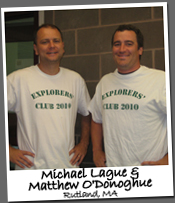Parents asked for it, and we listened: Glenwood Elementary School, in Rutland, Massachusetts, needed more enrichment opportunities afterschool. Together, with support from Glenwood families and our principal, we founded the Science Explorers Club afterschool program in the spring of 2010. Our combined years teaching at Glenwood truly informed our approach to building the Explorers Club afterschool program. We saw a great need for this club. Our shared passion for nature and the outdoors allowed us to reach out to the students, while making science fun. The Explorers Club meets one day after school for eight weeks, adopting curriculum from the Project Wild. Each week, the activity is kept a secret from the students. The anticipation builds, keeping them engaged and curious, creating a contagious excitement both inside and outside the classroom. Although we teach second and third graders, our club serves students from grade levels 2-4. Many include our own students. Our goal is to develop awareness, knowledge, and responsible behavior in these children with respect to the environment. It has been incredible to watch the students’ growth over the past couple of months. Even though their grade levels vary, everyone is learning something new each week. As teachers, the best part of the Explorers Club is that it allots time to do interesting, creative science that goes beyond what is usually offered in the in-school curriculum. During the school day, we do not have the instruction time to do hands-on projects like discovering the bones of various creatures and putting them together, let alone have the resources to develop a hands-on, innovative curriculum on habitats and ecosystems. On the other hand, our afterschool curriculum allows us to facilitate so many more projects with our students. For example, one of our afterschool activities addressed the ways in which water pollution can compromise the survival of wildlife in an ecosystem. First, the students filled bins with rocks and sand and blew bubbles into the container. Then, they observed how much more challenging it was to blow bubbles as the tank soon became filled with unusual items, representing trash. In another experiment, we recreated the effects of an oil spill. Not surprisingly, tying in our afterschool activities with current events has helped our students to better make the connection between science and the real world. At the end of the program, we hope to get students eager and interested in science, and to show them how fun it can be. Our original plan was to cap the program at around 20 students, but due to overwhelming interest, we expanded it to 25. The small student-teacher ratio allows us to get to know all of the students and provide them with the attention they need to grow and learn. The Explorers Club has become so popular that it inspired us to create a summer enrichment program, offering the students two sessions per day for four weeks. One session is based on the physical sciences and the other is based on wildlife. The programs we offer are both educational and affordable, making them accessible to most students. We are looking forward to increasing the buzz surrounding science education. Since the Explorers Club just wrapped up its first year, we are excited to get feedback from our students and parents to help guide it in the future. |








